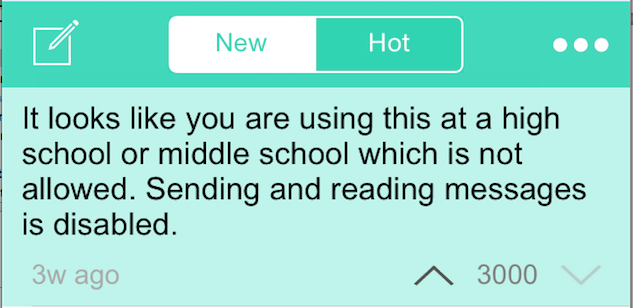Yik Yak
What do you get when you combine Twitter with anonymity? The new social media platform, Yik Yak. These anonymous “tweets” are called Yaks, and, although not created for this purpose, Yik Yak has become a very easy means for cyberbullying at high schools across the nation, including at Williston.
Yik Yak is a downloadable application for Apple and Android devices that does not involve creating an account. Once downloaded, one will see all Yaks sent within a 1.5 mile radius. The app was meant to act as a bulletin board for college campuses, but has been used at high schools and middle schools throughout the country.
For a few weeks in early spring, Yik Yak was used extensively on the Williston campus. It was a way for students to candidly express their opinions about different people and aspects of the Williston community, while always protected by anonymity.
David Koritkoski, Williston’s Assistant Dean of Students said in a recent joint interview with Dean of Students Kathryn Noble, “I think that anonymity of Yik Yak is the real challenge. People feel safer and more protected in their aggression when they’re hidden behind the shield. Yet it makes people that much more vulnerable who are on the other end of it—the targets are that much more vulnerable on something like Yik Yak.”
In a recent survey of Williston students conducted by The Willistonian, seventy percent of respondents ,129, of 186 students said that had been on Yik Yak. However, twenty percent, 39 students, said they had posted a Yak. Thirty-six percent, 65, students answered said they had been mentioned on Yik Yak. And of those 65 students who said they had been mentioned, forty said that what had been said about him or her was negative.
The negative use of the app on Williston’s campus of the app reached the point that Head of School, Robert Hill, addressed issue during the upper school’s April 16th assembly. “[When I was your age], if we were mean to someone else, we would talk behind their back…Now you can write something really nasty, really hurtful, and you can do it anonymously, and you can post it for anyone with a smartphone and a brain to read.”
Hill told the students, “We are better than this at Williston…Let’s be a school where you say, ‘I have your back,’ rather than, ‘Watch your back.’”
Koritkoski says that although Yik Yak is anonymous, it is in some ways better than the old-fashioned rumor, which has been greatly skewed by the time it reaches the recipient. “You can imagine, that’s even worse sometimes than some of social media we have today. Because at least with the social media today, you can read exactly what was said the first time.
The app was created by two Furman University students in November 2013. CEO of Yik Yak Tyler Droll told MarketWired.com that it was launched with the intent of “providing a virtual bulletin board of sorts for community engagement within a specific location.”
The app is meant to be used on college campuses, and its creators are working to eliminate it being used at middle schools and high schools by disabling access in the area of grade schools. A few weeks into the school’s third trimester, Yik Yak was disabled on Williston’s campus. Koritkoski says, “We helped to let them know where our campus was…I think it just took them a little while to get caught up with their own technology.”
Dean Noble says that she has been in contact with administrators at other New England prep schools about the use of Yik Yik. “[We’ve contacted our] peers at others schools, and I think we’ve all had similar incidents that we could discuss,” says Noble. “I think our students are very similar to other adolescents that [use] Yik Yaks. I don’t think our students were any worse or any better.”
Noble say, “These more recent apps really encourage the impulsive response. Everything is [either] thumbs up or thumbs down. I just see us making very quick judgments, [which] I’m concerned about.”
She notes, “The media isn’t bad, it’s how we choose to use it. It really is no different than twenty years ago, forty years ago, with some of the issues that your parent’s had on what they choose to do, or chooser to say. [Today] it’s just very amplified by that everyone can see it.”








